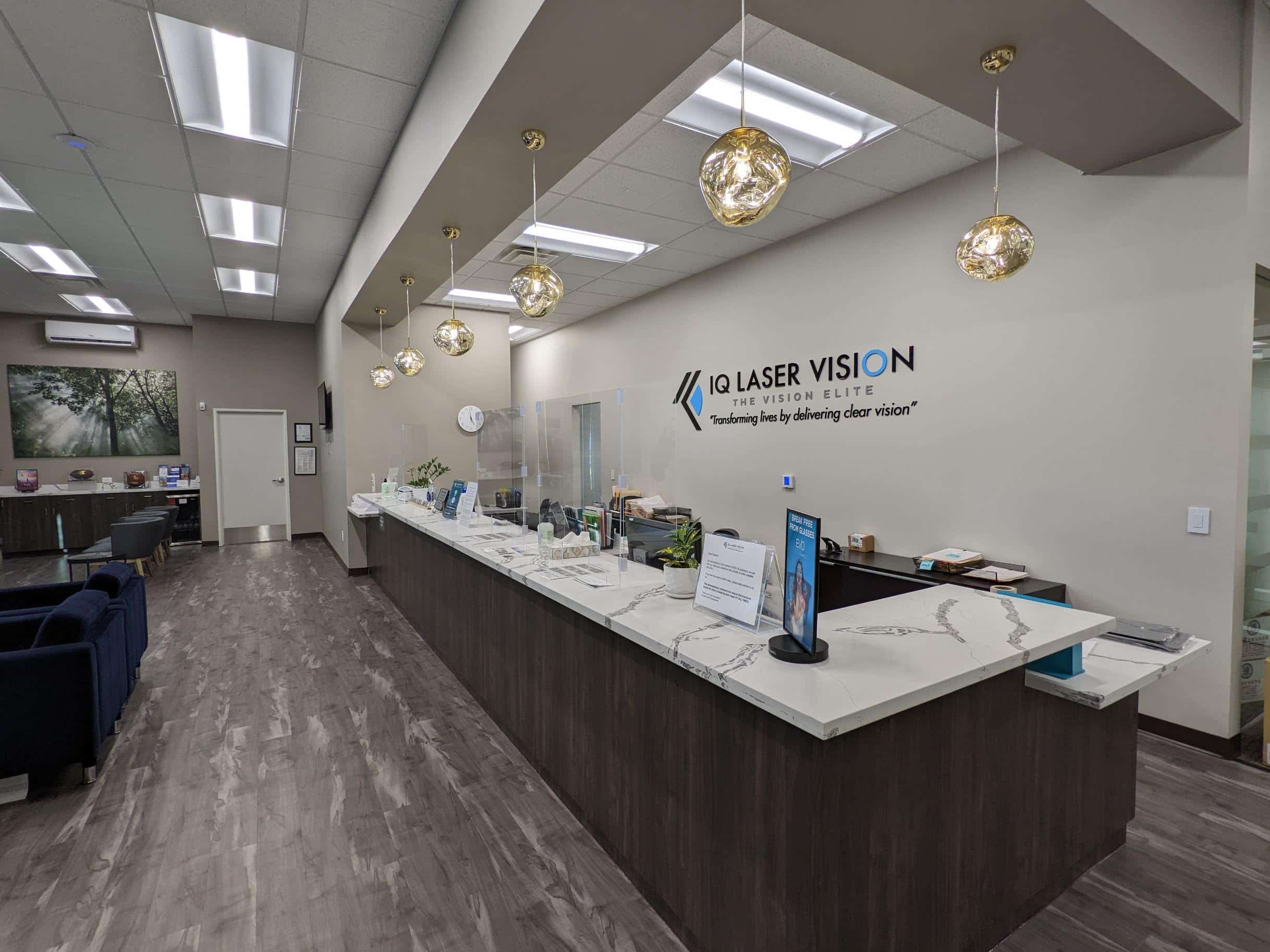Did you know that cataracts are a common sign of aging? We’re all about celebrating getting older, but why should we let this impact our eyesight? Here at IQ Laser Vision, our team of trained professionals offers premium services to cure many eye-related issues, including helping people who suffer from cataracts in Sherman Oaks. In addition to cataract treatment, we also specialize in LASIK surgery in Sherman Oaks, offering a range of solutions to improve your vision.
We’ve already performed over 300,000 procedures to improve our hundreds of thousands of patients' vision, so why don’t you be next?
What sets us apart from other cataract surgeons in Sherman Oaks is our expertise and passion for our trade. A primary goal for all IQ Laser Vision members is to provide an excellent service for all our customers, enabling them to lead fuller, and happier lives. You can trust that our services are quick and pain-free, which is backed up by our outstanding testimonials. That’s right, you can view our shining reviews online that prove we’re as good as we say we are.
If you're also searching for a cataract specialist in Los Angeles, our team at IQ Laser Vision extends its expertise beyond Sherman Oaks to provide comprehensive eye care.
Before you have cataracts, you can see clearly. Cataracts form in the lens of the eye, which needs to be clear to control how much light enters the retina.
If you have a cataract, the lens becomes cloudy due to proteins in the lens clumping together. With cataracts, your vision will get blurry if there isn’t enough light filtering into the retina.
With a cataract, you can no longer see through the lens easily. You may not even realize you have a cataract at first! Some patients can have cataracts for years or even decades without noticing.
A cataract can start with gradual blurry vision, or only some spots that you can't quite see out of. Over time, your cataracts will start to worsen. When this happens, you may start to notice that your vision is severely impacted. Some people have cataracts in both eyes.
If you have cataracts in both eyes, one cataract may be worse than the other. You could also only have one cataract in one eye.
There are many signs that go along with having a cataract. Although the most common sign is blurry vision, other signs include:






If you experience any of these signs or any sudden vision changes, talk to your eye doctor at IQ Laser Vision in Rowland Heights and other convenient locations. Although they sound like they could be cataracts, the only way to know for sure is to see your eye doctor.
They will evaluate any serious eye conditions or diseases during your eye exam.
Aging is the most common cause of developing cataracts. During middle age, it becomes more common to have hardened, thicker lenses. The tissues in the lens can break down and form proteins that make the lens cloudy. Over time, this makes your vision blurry. Your blurry vision will only get worse as you continue getting older. It may sound young, but you can start to develop cataracts as young as 40 or 50 years old!
Even if you have cataracts at this age, you may not realize it, since they probably won’t affect your sight. But the blurry vision and other signs that go with cataracts will get worse with time.
If you're older than 60, you're more likely to experience issues with your vision from cloudy lenses. If you've had any eye trauma or previous eye surgery, these can also cause cataracts by damaging the lens and limiting the light that reaches the retina.
If you're a diabetic, you’re more likely to develop cataracts since high blood sugar can increase fluid in the retina. Reduce your risks of developing cataracts by keeping your blood sugar as under control as you can! Even the medications you take can increase your risk of developing cataracts! Be careful if you take steroids or need radiation treatment. Talk to your doctor if you’re concerned about these side effects.
You can even be born with cataracts or develop them as a child. This is most likely to occur after an eye injury or an eye infection.

Love it! In the end, it is completely like being young again. The technique is top of the line and I wonder why I can see so clearly now, I see every pore. Only two weeks have passed and already I can thread the needle. I must say that the procedure is awesome!
If you have cataracts that are in the early stages, you may be able to get away with only needing prescription glasses. Talk to your eye doctor if you’ve increased your prescriptions frequently but your vision no longer feels like it’s improving. This is a common sign that it’s often time for cataract surgery. Cataracts only affect the lens, which makes some people think it’s fine to delay surgery. Most cataract surgeons recommend having cataract surgery when cataracts start to seriously impact your life. That means if you can no longer take part in your favorite hobbies or activities like fishing, cooking, or sewing because you can’t see, you may want to consider surgery.
Cataract surgery replaces your cloudy natural lenses with an artificial lens, known as an intraocular lens. The intraocular lens (IOL) is what allows you to have clear vision after cataract surgery!

Cataract surgery starts with numbing eye drops. This is to make sure you never feel any pain during the procedure. Your surgeon at IQ Laser Vision in Rowland Heights and other convenient locations will then use a speculum to support your eye before creating a small incision in the cornea. They use an ultrasound probe or laser to break up the natural lens.
Then, a suction tool gently removes the pieces of your natural lens. You won’t feel anything during this! Your surgeon will insert the artificial lens and place a protective patch over the treated eye.
So, what exactly are cataracts? And does it really need fixing? The short answer here would be yes, we would absolutely recommend visiting a cataract surgeon in Sherman Oaks if you have any of the following symptoms:
You may notice that your vision becomes cloudy or blurry which gets worse over time.
Individuals with cataracts often have even more difficulty with their sight at nighttime.
You often become more sensitive to light or glare from screens, as well as seeing a blurred ‘halo’ ring, which can impact clarity.
Many cataract sufferers claim they are seeing double, rather than one clear picture.
You may experience colors starting to fade or become a yellowish tone.
Unfortunately, as aging is the most common cause of cataracts, there’s nothing we can do to completely avoid this issue. There are, however, several things you can do to try to prevent the likelihood of early development:
Eat well, exercise regularly, quit smoking, and enjoy alcohol responsibly.
Make sure to wear sunglasses on sunny days, as the rays can contribute to cataract development.
Foods that contain vitamin A and omega 3 support eye health.
Make sure to get your eyes tested regularly to detect any early signs of disease.

After your surgeon at IQ Laser Vision clears you to go home, you’ll need to have a family member or close friend drive you home. Don’t think you can drive yourself home because you can’t. Take the time while you’re on your way home to rest! Rest is the best thing you can do after having cataract surgery. Your eye may feel dry, irritated, or scratchy, but these should go away after a few days.

Avoid any strenuous activities, especially anything that will make you bend over at the waist. This means no intense exercising, at least not right away! You can go for light walks around the block once you feel up to it but leave it at that to be safe.
You should also be very careful with your eye when you’re showering or bathing, since you shouldn’t get any water in your eyes. Shower with your eyes closed to prevent any water getting in your eyes while your eye heals.
The full recovery takes about 8 weeks, but it may take longer or less depending on your needs. Don’t forget to take the eye drops prescribed by your eye doctor to reduce inflammation and prevent infection exactly as recommended.
Following all instructions from your IQ Laser Vision ophthalmologist is the best way to ensure you’ll have a healthy and easy recovery after cataract surgery!
Request An Appointment
Typically, you’ll only have surgery on one eye at a time. For the best possible results, you’ll need to wait several weeks to a month between procedures. This period allows the first eye to heal so you can see before the second procedure.

There is no way to guarantee you will never develop cataracts. But the good news is, there are things you can do to try to prevent their early development.

On the whole, the procedure to cure cataracts is a smooth one, and your skilled cataract surgeon in Sherman Oaks will be there every step of the way to support you. Whether you're in Sherman Oaks or need a cataract surgeon in Orange County, our skilled team is ready to assist you. If you would like to find out more about how it all works, then head to our website to view our information regarding cataract surgery, and our other services, meet our doctors, and even peruse our useful blog. And of course, we are always on hand to answer any questions you may have via phone, our handy live chat function, or you can even receive a personalized consultation from one of our doctors absolutely free of charge.
Take Our Cataract Self-TestNo. You should not feel any discomfort. Your eyes will be numbed using anesthetic eye drops and you will be given light sedation.
You will spend only a few hours at the surgery center and will go home the very same day.
Each patient is unique and recovery time varies accordingly. Typically, patients see well enough to perform daily-activities the day after the procedure, and fully recover in about 2 weeks. Strenuous and physical activities should be avoided for 2 weeks after the procedure.
Night-vision improvement is one of the goals and benefits of the procedure but we will examine you to ensure you are fully recovered enough to do this highly demanding visual activity
No. Once a cataract has been treated it cannot return, because your existing lens is removed. However, over time, some patients may experience “Cataract-like symptoms,” such as cloudy vision. This conditionis known as posterior capsular opacification (PCO), sometimes referred to as “secondary cataract.” This occurs when the capsule which holds the lens becomes cloudy. It is easily treated with a simple procedure called YAG posterior capsulotomy that is quick, painless, and most patients see an improvement in vision clarity within a few days.
Although highly unlikely, an IOL can be removed/replaced with if needed.
















